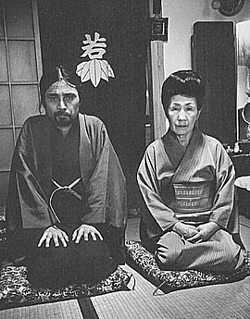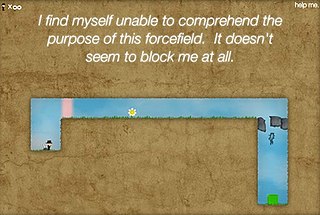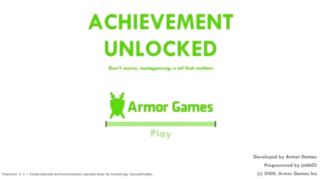Related Research Articles

Tatsumi Hijikata was a Japanese choreographer, and the founder of a genre of dance performance art called Butoh. By the late 1960s, he had begun to develop this dance form, which is highly choreographed with stylized gestures drawn from his childhood memories of his northern Japan home. It is this style which is most often associated with Butoh by Westerners.

Ron English is an American contemporary artist who explores brand imagery, street art, and advertising.

Cystectomy is a medical term for surgical removal of all or part of the urinary bladder. It may also be rarely used to refer to the removal of a cyst. The most common condition warranting removal of the urinary bladder is bladder cancer.
Worldbuilding is the process of constructing an imaginary world or setting, sometimes associated with a fictional universe. Developing the world with coherent qualities such as a history, geography, culture and ecology is a key task for many science fiction or fantasy writers. Worldbuilding often involves the creation of geography, a backstory, flora, fauna, inhabitants, technology, and often if writing speculative fiction, different peoples. This may include social customs as well as invented languages for the world.
An Open Game is a generic term for a family of chess openings beginning with the moves:

McKenzie Wark is an Australian-born writer and scholar. Wark is known for her writings on media theory, critical theory, new media, and the Situationist International. Her best known works are A Hacker Manifesto and Gamer Theory. She is a professor of Media and Cultural Studies at The New School.
The Gibraltar Barbarians Rugby Football Club (GRFC) is a rugby union club from Gibraltar and the surrounding Campo in Spain, who play in the Andalucian League as Gibraltar Barbarians RFC. They play their home games in the town of Guadiaro near Sotogrande in the Cadiz province of Spain. They currently play in the 1 Division National of the Federacion Andaluza de Rugby (FAR). In 2010, Campo Gibraltar is now a Gibraltar-based team and its name has been changed to Gibraltar Barbarians RFC.

Heather Kelley is a media artist, writer and video game designer. She is a co-founder of the Kokoromi experimental game collective, with whom she produces and curates the annual Gamma game event promoting experimental games as creative expression in a social context. She regularly appears as a jury member for several computer gaming festivals. She is also a frequent public speaker at technology events.

I Wish I Were the Moon is a short Flash game by Argentine game developer Daniel Benmergui. It has been described as "a short love story told in the form of a puzzle game." The game was, as part of a collection of Benmergui's games, a finalist at the Sense of Wonder Night at the 2009 Tokyo Game Show. The game brought its maker, Benmergui, to international attention.
Mattie Brice is an independent video game designer, critic, educator, and industry activist. Her games and writing focus on diversity initiatives in the games industry, discussing the perspective of marginalized minority voices to publications like Paste, Kotaku, and The Border House. Her games are freeware and do not require programming to create.

T. V. Kochubava (1955–1999) was an Indian writer of Malayalam literature, known for his novels and short stories. He published twenty three books covering the genres of novels, short stories, translations and plays and was a recipient of a number of awards including the Kerala Sahitya Akademi Award for Novel in 1996, besides several other honours.
Pepper Winters is an American novelist best known for dark romance, contemporary, romantic suspense, and erotica thrillers. Her romantic novels have reached The New York Times, The Wall Street Journal, and USA Today best sellers. She received the IndieReader Badge for a Top 10 Indie Bestseller in the romantic novels category. She currently has 30 books released in nine languages.

Gilles Lebreton is a French lawyer and politician. A successive member of Sovereignty, Identity and Freedoms and the National Front, which became the National Rally. He has been a municipal councilor for Montivilliers and Member of the European Parliament for West France since 2014.

Ine Gevers is a Dutch curator of contemporary art, writer and activist. Gevers is known for large themed exhibitions in which she explores the relationships between technology, power and identity. She has been called one of The Netherlands' most radical curators.
Chakkalakal Lonappan Jose, is an Indian playwright of Malayalam literature. One of the pioneers of popular Malayalam theatre and a former chairman of the Kerala Sangeetha Nataka Akademi, Jose is the author of 36 plays, 75 one-act plays, one children's play and Ormakalkku Urakkamilla, his autobiography. He is a recipient of the Kerala Sahitya Akademi Award for Drama, Kerala Sahitya Akademi Award for Overall Contributions, Kerala Sahitya Akademi Fellowship, Kerala Sangeetha Nataka Akademi Award, Kerala Sangeetha Nataka Akademi Fellowship and S. L. Puram Sadanandan Puraskaram of the Kerala Sangeetha Nataka Akademi.

U.S. Games Systems, Inc. (USGS) is a publisher of playing cards, tarot cards, and games located in Stamford, Connecticut. Founded in 1968 by Stuart R. Kaplan, it has published hundreds of different card sets, and about 20 new titles are released annually. The company's product line includes children's card games, museum products, educational cards, motivational cards, tarot cards, and fortune telling decks. These are marketed through a network of retailers, including bookstores, museum gift shops, metaphysical shops, greeting card stores; toy and game stores; hobby shops, and mail order catalogs.

TIGSource, short for The Independent Games Source, is a news blog and Internet community centered around the creation of independent video games, founded in 2005 by Jordan Magnuson but soon taken over by Derek Yu, both independent game developers. The site has been described as having been an important "cultural nexus" for the creation of indie games development in the 2000s and early 2010s, and a key player in changing the perception of independent video games as merely casual games to that of an art form. Its forums were the launchpad for several award-winning games, including the best-selling video game of all time, Minecraft, BAFTA-winning dystopian immigration officer simulation Papers, Please, viral phenomenon QWOP, puzzle-platform game Fez, and Yu's own Spelunky. The site was in 2009 referred to as "one of the primary sources of information about the indie scene on the web and host to one of indie's best forums, bringing creators and fans together to share novel new ideas and the greatest new games." In 2008, it was chosen as one of "100 top sites for the year ahead" by The Guardian.

The Company of Myself is a 2009 Flash platformer by Eli Piilonen featuring a hermit as the protagonist whose depressed inner thoughts appears as writing on the "walls" of the game. Piilonen has stated that the "core intent [of the game] is to be half puzzle game and half character study". It's been frequently cited as an early example of an art game and has received praise for how it deals with issues of mental health. Tom Fronczak of Destructoid called the game "brilliant". It was included in Michael Rose's 2014 book "250 Indie Games You Must Play" and has been frequently cited in video games research. Piilonen later released a prequel for the game called Fixation.

Achievement Unlocked is an Adobe Flash video game written by John Cooney in four days and published by Armor Games in 2008. The player controls an elephant who moves and jumps around a level with the goal of completing every achievement. Such achievements include finding hidden numbers, dying, or even doing nothing for a period of time.
References
- 1 2 "These Games Explore the Struggle to Seek Psychological Help". www.vice.com. 16 August 2016.
- ↑ Childs, Mark; Peachey, Anna (2013). Understanding learning in virtual worlds. London. p. 11. ISBN 9781447153702.
{{cite book}}: CS1 maint: location missing publisher (link) - ↑ Savage, Steven (1 January 2014). "Interview: Eli Piilonen dev for Not The Robots". Indie Haven.
- ↑ Rose, Mike (2011). 250 indie games you must play. Boca Raton, FL. p. 162. ISBN 9781439875759.
{{cite book}}: CS1 maint: location missing publisher (link) - ↑ Salter, Anastasia (2014). Flash: building the interactive web. Cambridge, Massachusetts. pp. 108–109. ISBN 9780262028028.
{{cite book}}: CS1 maint: location missing publisher (link) - ↑ "A medley of meanings: Insights from an instance of gameplay in League of Legends". Journal of Comparative Research in Anthropology and Sociology (1/2015): 228.
- ↑ Vargas-Iglesias, Juan J. (1 July 2019). "Semiotic and discursive consequences of the cybertextual condition: The case of tragedy". Semiotica. 2019 (229): 329–352. doi:10.1515/sem-2017-0114. S2CID 182259662.